|
The goal of the Matsés Movement is the
cultural survival of the Matsés people in a manner that is economically feasible and independent (i.e.
sustainable).
In order for the Matsés communities to preserve
their culture and lands in a sustainable and independent manner, it is necessary
for them to have certain resources, most importantly basic health services and
education. At present, disease epidemics jeopardizes the survival of
the Matsés people. In addition, education and knowledge of the outside
world is necessary for them to be able to defend their lands and way of life.
Matsés society has avoided depravities such as alcohol abuse that have destroyed
other indigenous cultures. Furthermore, the Matsés have a strong work
ethic and high moral values. Given the chance to help themselves,
the Matsés people and their culture are capable of surviving in a changing
world.
Adopt an Indigenous School
Program:
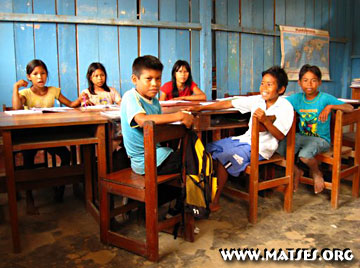 One
of the keys to maintaining an indigenous culture is education. In order to
educate the Matses youth, it is necessary for them to have basic schools
supplies such as notebooks, textbooks and pencils. Our organization has
recently launched a new Adopt an Indigenous School Program in order to provide
basic school supplies to students and teachers. With these school
supplies, Matsés children can receive a basic education and learn how to read
and write in both Spanish and their native language of Matsés. To learn
more about the Adopt an Indigenous School Program and how you can support this
project, please visit
Adopt an Indigenous School. One
of the keys to maintaining an indigenous culture is education. In order to
educate the Matses youth, it is necessary for them to have basic schools
supplies such as notebooks, textbooks and pencils. Our organization has
recently launched a new Adopt an Indigenous School Program in order to provide
basic school supplies to students and teachers. With these school
supplies, Matsés children can receive a basic education and learn how to read
and write in both Spanish and their native language of Matsés. To learn
more about the Adopt an Indigenous School Program and how you can support this
project, please visit
Adopt an Indigenous School.
Medical Support:
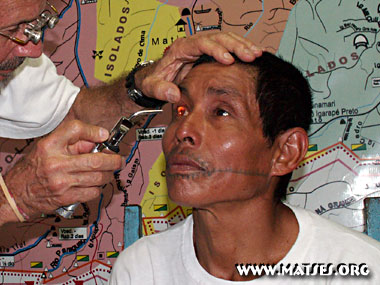 Currently, two diseases are devastating the Matsés
population. Malaria and hepatitis have the potential to wipe out the
Matsés communities and with them, their culture. During recent
years, some Matsés communities have had the majority of the population contract
malaria. Similarly, some indigenous communities in the Yavarí Valley have
had mortality rates of 10% of their population per year due to hepatitis.
Both diseases are controllable - malaria with medications and hepatitis with
vaccinations and clean water systems. Like many other indigenous peoples,
the Matsés have decreased resistance to many western diseases and normally minor
afflictions, such as the common cold, can become life-threatening diseases. Currently, two diseases are devastating the Matsés
population. Malaria and hepatitis have the potential to wipe out the
Matsés communities and with them, their culture. During recent
years, some Matsés communities have had the majority of the population contract
malaria. Similarly, some indigenous communities in the Yavarí Valley have
had mortality rates of 10% of their population per year due to hepatitis.
Both diseases are controllable - malaria with medications and hepatitis with
vaccinations and clean water systems. Like many other indigenous peoples,
the Matsés have decreased resistance to many western diseases and normally minor
afflictions, such as the common cold, can become life-threatening diseases.
Clean Water Systems:
 Prevention of hepatitis is relatively simple -
the installation of clean water systems (i.e. wells) can control this
virus that has devastated numerous indigenous communities in the Yavarí Valley.
At present, none of the nineteen Matsés communities in Peru has a functioning
well. Instead, the Matsés are using surface rather than ground water for
drinking. With the high water table of the Amazon Rainforest, it is
relatively easy and economical to install wells that provide clean water.
Our goal is to install clean water systems in all Matsés communities. In
addition, maintenance of the systems is important and requires the training and participation
of the communities. Prevention of hepatitis is relatively simple -
the installation of clean water systems (i.e. wells) can control this
virus that has devastated numerous indigenous communities in the Yavarí Valley.
At present, none of the nineteen Matsés communities in Peru has a functioning
well. Instead, the Matsés are using surface rather than ground water for
drinking. With the high water table of the Amazon Rainforest, it is
relatively easy and economical to install wells that provide clean water.
Our goal is to install clean water systems in all Matsés communities. In
addition, maintenance of the systems is important and requires the training and participation
of the communities.
Communal Handicrafts Workshop:
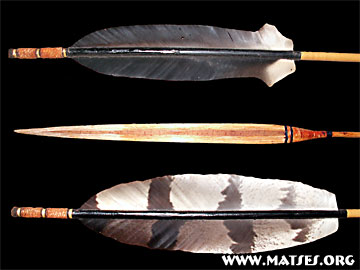 Currently the Matsés people have no regular
economic income and the main source of hard currency is selling meat and pelts
from the animals they hunt. Over-hunting has reduced collared peccary and
tapir populations below sustainable levels. An alternative to obtaining
much needed hard currency by selling hunted game is selling handicrafts.
Ironically, the Matsés can sell the implements (e.g. bows and arrows)
they are using to over hunt their lands in order to obtain sorely needed cash.
Selling handicrafts is sustainable in that it does not exhaust resources as can
hunting. Moreover, it maintains the material culture and traditions of the
Matsés by giving them the economic incentive to produce their traditional
handicrafts (bows, arrows, spears, basketry, and woven items). Some Matsés
communities are losing the knowledge of how to produce these items,
and this project, properly implemented, may well result in a renaissance of
Matsés art and craftsmanship. Currently the Matsés people have no regular
economic income and the main source of hard currency is selling meat and pelts
from the animals they hunt. Over-hunting has reduced collared peccary and
tapir populations below sustainable levels. An alternative to obtaining
much needed hard currency by selling hunted game is selling handicrafts.
Ironically, the Matsés can sell the implements (e.g. bows and arrows)
they are using to over hunt their lands in order to obtain sorely needed cash.
Selling handicrafts is sustainable in that it does not exhaust resources as can
hunting. Moreover, it maintains the material culture and traditions of the
Matsés by giving them the economic incentive to produce their traditional
handicrafts (bows, arrows, spears, basketry, and woven items). Some Matsés
communities are losing the knowledge of how to produce these items,
and this project, properly implemented, may well result in a renaissance of
Matsés art and craftsmanship.
Cultural Education Program:
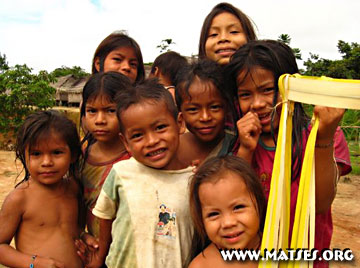 The President of our organization has written a book entitled,
The Traditional Life of the Matsés. In order to appeal to greater
audience, the book is written in three languages - Matsés, Spanish, and English.
The main purpose of this book is teach the Matsés youth of the cultural
traditions of the Matsés. Currently, professors in the Matsés communities
are using this book to teach the youth about traditional Matsés society in order
to maintain their way of life. The book is meant to complement and not
take the place of the Matsés oral tradition of teaching youth about the ways of
their ancestors. It is important that Matsés children learn the Matsés
language. The President of our organization has written a book entitled,
The Traditional Life of the Matsés. In order to appeal to greater
audience, the book is written in three languages - Matsés, Spanish, and English.
The main purpose of this book is teach the Matsés youth of the cultural
traditions of the Matsés. Currently, professors in the Matsés communities
are using this book to teach the youth about traditional Matsés society in order
to maintain their way of life. The book is meant to complement and not
take the place of the Matsés oral tradition of teaching youth about the ways of
their ancestors. It is important that Matsés children learn the Matsés
language.
Sustainable Agriculture Development:
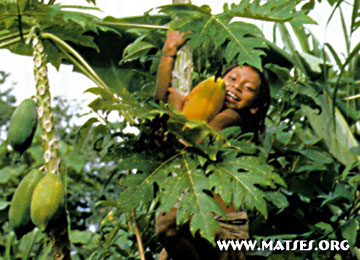 The Matsés no longer live a nomadic life as they
once did moving their settlements every few years as they exhausted the
resources of the area. At present with permanent settlements, it is
necessary for them to change their agricultural practices to more sustainable
systems. Tropical soils are fragile and it takes much time for them to
recover after exhausting their nutrients. The Matsés need to develop new
agriculture methods and crops to sustain productivity on their lands.
Successful innovative agricultural projects have been implemented in other
indigenous communities (e.g. the cultivation of Aguaje palms [Mauritia
flexuosa] and the reforestation of agricultural areas with fruit trees)
and serve as models of sustainability. The Matsés no longer live a nomadic life as they
once did moving their settlements every few years as they exhausted the
resources of the area. At present with permanent settlements, it is
necessary for them to change their agricultural practices to more sustainable
systems. Tropical soils are fragile and it takes much time for them to
recover after exhausting their nutrients. The Matsés need to develop new
agriculture methods and crops to sustain productivity on their lands.
Successful innovative agricultural projects have been implemented in other
indigenous communities (e.g. the cultivation of Aguaje palms [Mauritia
flexuosa] and the reforestation of agricultural areas with fruit trees)
and serve as models of sustainability.
Aquaculture of Fishes:
 Aquaculture, analogous to
the sustainable agriculture of cultivated plants,
involves the enhancement of fish populations to augment the natural supply.
Rearing fish under enhanced conditions allows a more consistent supply under the
highly fluctuating water levels that occur in the Amazon. Aquaculture will
also prevent the over harvesting of endangered fish species, such as the
paiche (Arapaima gigas), thus conserving their populations.
Traditionally, the Matsés have used toxic plant substances such as barbasco
(Lonchocarpus spp.) and huaca (Solanaceae) to harvest fish.
Aquaculture represents a more sustainable method that will maintain a more
consistent supply of fish. Aquaculture, analogous to
the sustainable agriculture of cultivated plants,
involves the enhancement of fish populations to augment the natural supply.
Rearing fish under enhanced conditions allows a more consistent supply under the
highly fluctuating water levels that occur in the Amazon. Aquaculture will
also prevent the over harvesting of endangered fish species, such as the
paiche (Arapaima gigas), thus conserving their populations.
Traditionally, the Matsés have used toxic plant substances such as barbasco
(Lonchocarpus spp.) and huaca (Solanaceae) to harvest fish.
Aquaculture represents a more sustainable method that will maintain a more
consistent supply of fish.
Matsés Native Community:
 At present, the Matsés are seeking the
expansion of the Matsés Native Community lands to include the areas directly adjoining the present
Matsés titled lands. The amplification of the Matses territory will guarantee the
sustainability of the region and prevent destructive practices such as
logging and the establishment of settlements by outsiders. Moreover, it
will provide watershed protection and permanent preservation of an important
source area for fish and wildlife populations. At present, the Matsés are seeking the
expansion of the Matsés Native Community lands to include the areas directly adjoining the present
Matsés titled lands. The amplification of the Matses territory will guarantee the
sustainability of the region and prevent destructive practices such as
logging and the establishment of settlements by outsiders. Moreover, it
will provide watershed protection and permanent preservation of an important
source area for fish and wildlife populations.
For more information on how your can work with the Matsés Movement, please contact:
The Matsés Movement
Iquitos, Peru
Telephone:
(+51) 965-000650
E-mail :
info@matses.org
|